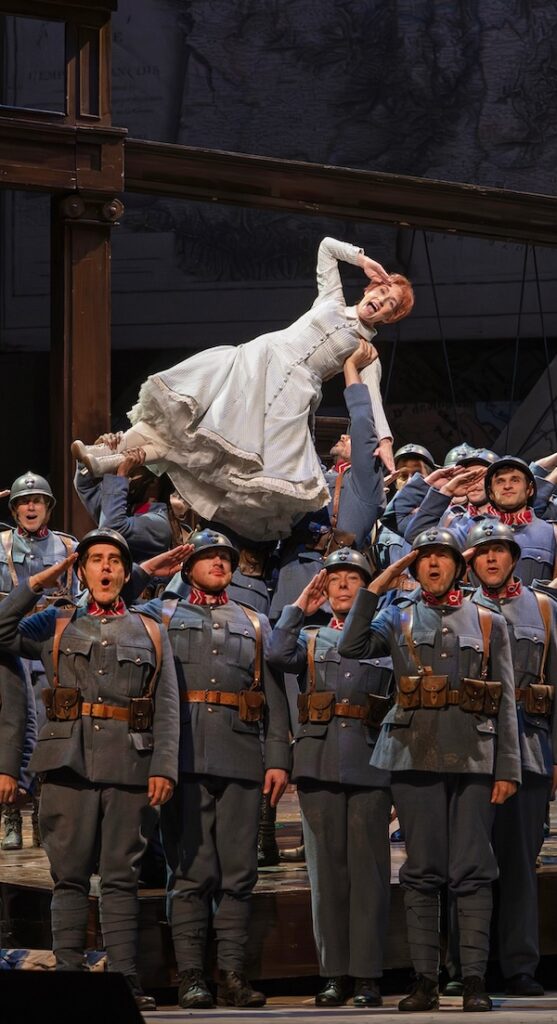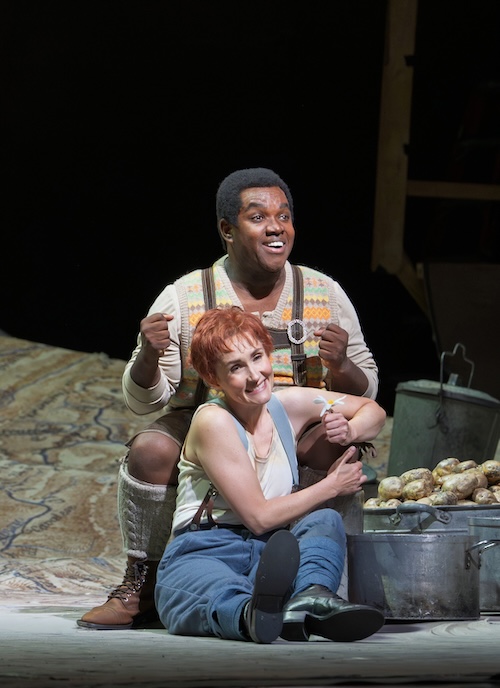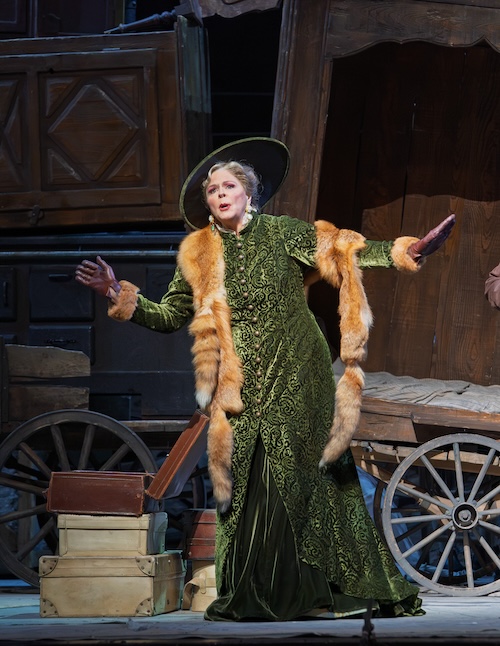Morley, Brownlee spark the fireworks in Met’s “La fille” as Graham anchors the evening

The Laurent Pelly production of Donizetti’s La fille du regiment returned to the Metropolitan Opera Friday night with two stars known for their exploration of the vocal stratosphere, soprano Erin Morley as Marie and tenor Lawrence Brownlee as her swain Tonio.
While neither singer displayed a room-filling voice, an attentive listener could pick up many a pearl of inflection and coloratura, especially from Morley, who at stressful moments in the story even managed some singerly sparkles in her spoken dialogue.
For all her ability to spray high notes effortlessly into the air, the soprano’s most memorable moments came in thoughtful arias like “Par le rang et par l’opulence,” where the ironies of her situation—a wartime foundling, potentially a duchess, yet torn away from her true love—was reflected in finely nuanced phrasing.
Knockabout action was her character’s default mode in Act I, which made her aunt’s smothering her in petticoats in Act II seem particularly misguided. To show what Marie thought about her stuffy singing lessons, Morley recycled some of her robot-doll moves from last season’s Les Contes d’Hoffmann.
By design, listening to a tenor sing the part Donizetti wrote for Tonio is like watching a steeplechase—will the horse clear all the barriers? On Friday night, Brownlee cleared them.

More importantly, did he do what it took to make the story feel real? Singing the hearty cavatina “Ah! mes amis,” Brownlee managed to include his soldier comrades in the scene even while facing the audience most of the time. His voice was consistent in tone throughout and well supported, making a pleasing and characterful performance. As for how many high C’s he hit in the process, you’ll have to turn to the sports page for that.
The production benefited immensely from the stage presence of mezzo-soprano Susan Graham as the Marquise of Berkenfield, Marie’s “aunt” (later revealed to be her mother). (Graham replaced the originally slated Alice Coote, who bowed out due to “unforeseen personal circumstances.”) The story, such as it is, pivots around the Marquise and her various actions and revelations. Graham’s clear voice provided a firm foundation for ensembles, and while lovers, soldiers and servants bounced around the stage, her economical acting helped keep things centered.
One wondered, though, whether her character would wear such a plain (though flattering) long dress to a meeting with the ornate Duchess of Krakenthorp. It seemed a needlessly gross way for Pelly, who also designed the costumes, to emphasize the two characters’ difference in rank. The rest of the production design, moved up from the Napoleonic Wars to World War I, seemed spot on. (Does anyone ever set an opera production in a period before the one indicated in the libretto?)

Speaking of stage presence, the actress Sandra Oh was a sight to behold in the speaking role of the aforementioned Duchess, her much-publicized Met debut. The audience applauded her first entrance, swathed in indigo from large hat to toe, then laughed as she sashayed around the Marquise’s music room, fanning herself. They also liked her few scripted lines and interpolated wisecracks.
Peter Kálmán projected the hard-soft role of Sergeant Sulpice, Marie’s prime daddy in a regiment of daddies, in a suitably gruff bass-baritone. Another bass-baritone, Paul Corona, effectively portrayed Sulpice’s exact opposite, the Marquise’s officious and judgmental servant Hortensius. Stephan Varnier was well-dressed and efficient in the speaking role of the Notary preparing the contract for Marie’s marriage (to the other guy, oh no!).
This being an opera with spoken dialogue, most of the plot’s twists and reveals happened while people were talking, so the orchestra, conducted by Giacomo Sagripanti, didn’t play much of a role in advancing the story. The overture set the Alpine scene with horn calls, then sputtered a bit in the allegro before hitting its stride in the frothy coda. Sagripanti accompanied the showy arias and ensembles alertly, and wrapped the softer ones in cushiony woodwinds.
La fille du regiment runs through November 12. metopera.org



